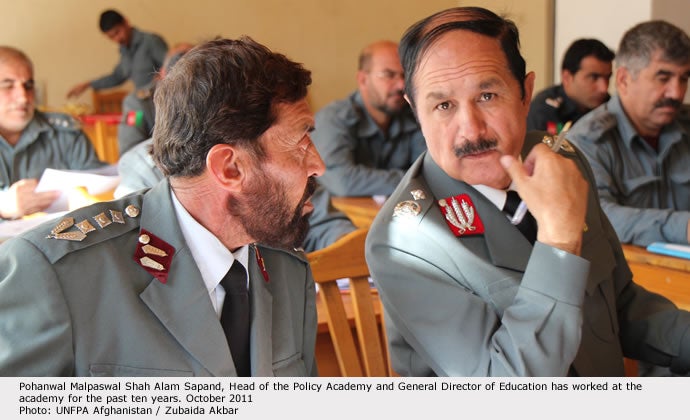"Gender based violence is a social problem that not only the police, but every member of the society must fight against", said Pohanwal Malpaswal Shah Alam Sapand, Head of the Police Academy, who also attended the training on Gender Based Violence conducted by UNFPA, at the National Police Academy in Kabul in October 2011.

Highlighting the positive role the civil security mechanisms can have in preventing violence against women and other forms of gender based violence (GBV), UNFPA cooperated with the Ministry of Interior to assist the National Police Academy (NPA) in developing its educational curricula. It assisted NPA in performing a full review of the NPA curricula, and enabled the development of the tailor-made training manual "Police Taking Action on Violence against Women in Afghanistan" and related course curricula.
With the curriculum in place, UNFPA undertook a Training of Trainers for the GBV curriculum, at the NPA in Kabul. The police academy further plans to fight against GBV, is to train police officers at the provincial level, where there are more cases of violence against women.
Training participants actively analyzed the causes of Gender Based Violence in Afghanistan, and linked it to some extent, to traditional perceptions of gender roles, as well as to misinterpretation of religious concepts.
"This training forces us to reflect on how we disrespect humanity and treat women as objects. A man's physical power cannot justify his inhuman acts towards women. We must fight gender based violence against women, not just as police personnel, but also as human beings. It is the responsibility of every Afghan to spread the message of equality and mutual respect among people", said Mr. Pohandoi Samonwal Sayed Abdul Qayoom, Professor of Law at the academy and a participant in the GBV training.
Mr. Pohanwal Malpaswal Shah Alam Sapand stressed the importance of training police officers and cadets on GBV, for bringing justice to the lives of Afghans. He declared the intention of the Police Academy staff and management to continue such trainings and extend them to other provinces of Afghanistan.
The policy academy of Afghanistan currently provides professional training to 3000 students through different programs. About 2000 students are being trained for the police force in six-month long training programs, and 500 students are enrolled in a three year long program. Regular short term trainings on different relevant topics are also provided to 200 students.

